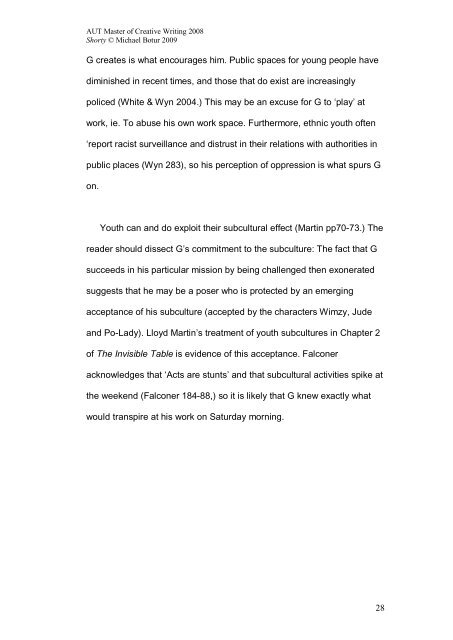AUT Master of Creative Writing Thesis Exegesis - Scholarly ...
AUT Master of Creative Writing Thesis Exegesis - Scholarly ...
AUT Master of Creative Writing Thesis Exegesis - Scholarly ...
You also want an ePaper? Increase the reach of your titles
YUMPU automatically turns print PDFs into web optimized ePapers that Google loves.
<strong>AUT</strong> <strong>Master</strong> <strong>of</strong> <strong>Creative</strong> <strong>Writing</strong> 2008<br />
Shorty © Michael Botur 2009<br />
G creates is what encourages him. Public spaces for young people have<br />
diminished in recent times, and those that do exist are increasingly<br />
policed (White & Wyn 2004.) This may be an excuse for G to ‘play’ at<br />
work, ie. To abuse his own work space. Furthermore, ethnic youth <strong>of</strong>ten<br />
‘report racist surveillance and distrust in their relations with authorities in<br />
public places (Wyn 283), so his perception <strong>of</strong> oppression is what spurs G<br />
on.<br />
Youth can and do exploit their subcultural effect (Martin pp70-73.) The<br />
reader should dissect G’s commitment to the subculture: The fact that G<br />
succeeds in his particular mission by being challenged then exonerated<br />
suggests that he may be a poser who is protected by an emerging<br />
acceptance <strong>of</strong> his subculture (accepted by the characters Wimzy, Jude<br />
and Po-Lady). Lloyd Martin’s treatment <strong>of</strong> youth subcultures in Chapter 2<br />
<strong>of</strong> The Invisible Table is evidence <strong>of</strong> this acceptance. Falconer<br />
acknowledges that ‘Acts are stunts’ and that subcultural activities spike at<br />
the weekend (Falconer 184-88,) so it is likely that G knew exactly what<br />
would transpire at his work on Saturday morning.<br />
28
















